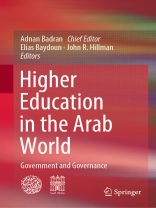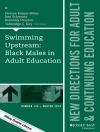This book examines the unsatisfactory situation in the Arab world where there is a pressing need to address poverty, unemployment, political instability, corruption, and the existential threat of climate change. The authors analyze the relationships between universities and governments in the Arab world, and make recommendations that will help develop intellectual capacity and thereby aid the economic and social transitions so desperately needed in all Arab countries.
Countries aspiring to participate fully in the global knowledge economy require dynamic university sectors operating in concert with governments that actively promote high-quality education and research and foster innovation and entrepreneurship. Successful university-government relationships can be complex and are continually evolving.
Tabella dei contenuti
1. Review of the Roles of Governments and Universities and their Interrelationships: An Urgent Need for Governance Reform in the Arab World.- 2. Friend or Foe? Governors and Governance in Higher Education.- 3. Government and Governance in Arab Universities: Alignment or Conflict?.- 4. Governance and Decision-making in Arab Universities.- 5. Innovation as a Principle in University Governance: A Holistic Approach for Arab Universities.
Circa l’autore
Professor Adnan Badran is the Chancellor of the University of Petra and the Chairman of the Board of Trustees of the University of Jordan. He is a biologist with over 120 publications, including 22 books and 4 patents. He was awarded an Honorary Doctorate from Sungkyunkwan University, Seoul (1981); an Honorary Doctorate in Science from Michigan State University, (2007); an Honorary Doctorate in Business from Yarmouk University, Jordan (2014); the West Watkins distinguished Lectureship Award (2009) USA; the Hall of Fame Alumni Award from Oklahoma State University, USA; and the Honorary Professorship from L.N. Gumilev Eurasian National University Kazakhstan (2012). Also, he was awarded the Arab Thought Foundation for best Arab scientist in higher education research (2005); the TWAS Regional Prize for ‘Building Scientific Institutions’ (2009); the World Education Asia award for Outstanding Contribution to Education (2011) and the Shoman award for Peer review of young Arabscientists. Badran was Prime Minister (2005), Minister of Agriculture (1989) and Minister of Education (1989) in Jordan. He was Senator and Chair of the Senate Committee on Science, Education and Culture (2006-2010). He also served as Deputy Director-General of UNESCO (1994-1998) and Assistant Director General, Paris (1990-1994). Founding President of Yarmouk University and Jordan University of Science and Technology (1976-1986), President of Philadelphia University (1998-2005) and President of University of Petra (2007-2014), and Dean of the Faculty of Sciences at the University of Jordan (1971-1976). Secretary General (1986-1987) and Vice-president (2014- ) of the Higher Council for Science and Technology, Jordan. President of the National Centre of Human Rights, Jordan (2008-2011) and President of the Asia-Pacific Forum on Human Rights, Sidney (2009-2011). Member of the Board of Trustees of the Arab Thought Forum (2012- ). He is a Fellow and former Vice-president of the Academyof Sciences for the Developing World (TWAS), Fellow of the Islamic World Academy of Sciences (IAS) and President of the Arab Academy of Sciences. Chairman of the Board of the Arab Forum for Environment and Development in Beirut (2008- ). President of the Higher Council of the National Centre for Curriculum development (2017-2019) and Chairman of Shoman Trust Fund for Research (2019- ). Badran received his B.Sc from Oklahoma State University (1959), and Master then Ph D from Michigan State University (1963), USA.
Professor Elias Baydoun was educated at the University of Jordan, Amman (BS 1971), the American University of Beirut (AUB; MS 1977), and the University of Cambridge where he obtained his MPhil in 1978 and Ph D in 1980. He is currently Professor of Biology at AUB, Secretary General of the Arab Academy of Sciences and Adjunct Professor at the University of Petra in Jordan. Previous positions included: Chairman of Biology (1978-93) and Associate Professor at AUB; Associate Professor, Assistant President (1983-86), Director of Planning and Development (1985-1986), and Director of Personnel (1985-1986) at Yarmouk University, Jordan. His awards include: Federation of Arab Scientific Research Councils Award, Abdul Hamid Shoman Prize for Young Arab Scientists for Biology, AUB Research Award in Natural Sciences (twice), Distinguished Scholar Award of the Arab Fund for Economic and Social Development, Developing World Study Award of the Royal Society UK and TWAS-ARO Regional Prize for Public Understanding and Popularization of Science. He is Fellow of several learned societies including the Institute of Biology, London, TWAS, Islamic World Academy of Sciences and the Arab Academy of Sciences. He organized and chaired 21 international conferences on topics related to the development of the Arab Middle East Region. His research interests include membrane and carbohydrate biology, biotransformation, nanotechnology, and medicinal plants.Professor Baydoun supervised and served on the committees of 60 Ph D and MS students. He has published over 100 articles in international refereed journals and over 120 abstracts and papers in the proceedings of international conferences, as well as authoring several biology textbooks for secondary schools and community colleges. He is the first inventor of a patent on treatment of protozoal diseases (US Patent 9, 173, 888). He translated into Arabic a university textbook in biochemistry and was the General Coordinator of the four volumes of the Arabic Encyclopaedia on Knowledge for Sustainable Development published by UNESCO. He is the editor of four books published by Springer; one on “Water, Energy and Food Sustainability in the Middle East – The Sustainability Triangle” and three on Higher Education in the Arab World. He is a member of the Editorial Board of Scientific Reports, a journal from Nature Publishing Group anf other journals. He served as consultant for several local, regional, and international organizations including UNESCO and UNEP.
Professor John Hillman, Director and Chief Executive of the Scottish Crop Research Institute (SCRI) during 1986-2005, oversaw the incorporation of the Scottish Agricultural Statistics Service (later retitled Biomathematics and Statistics Scotland – Bio SS), staff transfers from the Macaulay Institute for Soil Research, links with the University of Dundee, establishment of Mylnefield Research Services Ltd, new buildings, expansion of staff numbers, and major revision of the research portfolio. Prior to his appointment at SCRI, he was Professor and Head of the Department of Botany, University of Glasgow. In the period 1995-1997, he was Chairman of the UK Technology Foresight Sector Panel on Agriculture, Natural Resources and Environment and then the Agriculture, Horticulture and Forestry Sector Panel. During 2000-2005, he was a member of the Board of Directors of the Bio Industry Association and chairman of its Industrial Biotechnology Group. Other positions held include President of the Agriculture and Food Section of the British Association; member of Court of the University of Abertay Dundee; visiting professorships in the Universities of Dundee, Edinburgh, and Strathclyde; editor and referee for several scientific journals; various committees of the Royal Society of Edinburgh; and member of the Scottish Funding Council Research and Knowledge Transfer Committee. He is scientific advisor to various organisations including the Arab Academy of Sciences.












